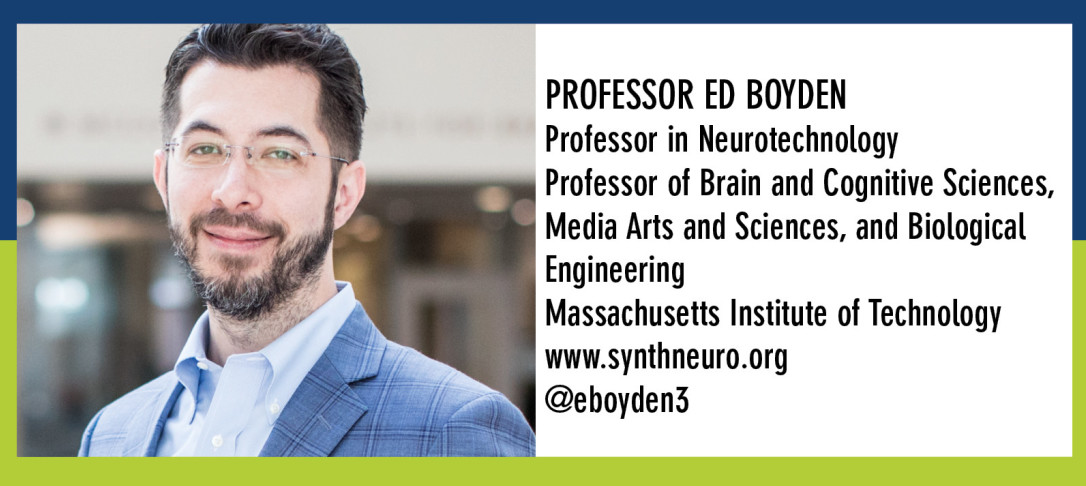
Catch up on this Bioengineering Department Seminar on our YouTube channel: Click here to watch
Talk title:
Tools for Analysing and Controlling Biological Systems
Abstract:
Understanding and repairing complex biological systems, such as the brain, requires technologies for systematically observing and controlling these systems. We are discovering new molecular principles that enable such technologies. For example, we discovered that one can physically magnify biological specimens by synthesizing dense networks of swellable polymer throughout them, and then chemically processing the specimens to isotropically swell them. This method, which we call expansion microscopy, enables ordinary microscopes to do nanoimaging – important for mapping the brain across scales. Expansion of biomolecules away from each other also decrowds them, enabling previously invisible nanostructures to be labelled and seen. As a second example, we discovered that microbial opsins, genetically expressed in neurons, could enable their electrical activities to be precisely controlled in response to light. These molecules, now called optogenetic tools, enable causal assessment of how neurons contribute to behaviours and pathological states, and are yielding insights into new treatment strategies for brain diseases.
Finally, we are developing, using new strategies such as robotic directed evolution, fluorescent reporters that enable the precision measurement of signals such as voltage and calcium. By fusing such reporters to self-assembling peptides, they can be stably clustered within cells at random points, distant enough to be resolved by a microscope, but close enough to spatially sample the relevant biology.
Such clusters, which we call signalling reporter islands (SiRIs), permit many fluorescent reporters to be used within a single cell, to simultaneously reveal relationships between different signals. We share all these tools freely, and aim to integrate the use of these tools so as to enable comprehensive understandings of neural circuits.
Biography:
 Ed Boyden is Y. Eva Tan Professor in Neurotechnology at MIT, an investigator of the Howard Hughes Medical Institute and the MIT McGovern Institute, and professor of Brain and Cognitive Sciences, Media Arts and Sciences, and Biological Engineering at MIT. He leads the Synthetic Neurobiology Group, which develops tools for analysing and repairing complex biological systems such as the brain, and applies them systematically to reveal ground truth principles of biological function as well as to repair these systems. He co-directs the MIT Centre for Neurobiological Engineering, which aims to develop new tools to accelerate neuroscience progress, and is a faculty member of the MIT Centre for Environmental Health Sciences, Computational & Systems Biology Initiative, and Koch Institute.
Ed Boyden is Y. Eva Tan Professor in Neurotechnology at MIT, an investigator of the Howard Hughes Medical Institute and the MIT McGovern Institute, and professor of Brain and Cognitive Sciences, Media Arts and Sciences, and Biological Engineering at MIT. He leads the Synthetic Neurobiology Group, which develops tools for analysing and repairing complex biological systems such as the brain, and applies them systematically to reveal ground truth principles of biological function as well as to repair these systems. He co-directs the MIT Centre for Neurobiological Engineering, which aims to develop new tools to accelerate neuroscience progress, and is a faculty member of the MIT Centre for Environmental Health Sciences, Computational & Systems Biology Initiative, and Koch Institute.
Amongst other recognitions, he has received the Wilhelm Exner Medal (2020), the Croonian Medal (2019), the Lennart Nilsson Award (2019), the Warren Alpert Foundation Prize (2019), the Rumford Prize (2019), the Canada Gairdner International Award (2018), the Breakthrough Prize in Life Sciences (2016), the BBVA Foundation Frontiers of Knowledge Award (2015), the Carnegie Prize in Mind and Brain Sciences (2015), the Jacob Heskel Gabbay Award (2013), the Grete Lundbeck Brain Prize (2013), the NIH Director’s Pioneer Award (2013), the NIH Director’s Transformative Research Award (three times, 2012, 2013, and 2017), and the Perl/UNC Neuroscience Prize (2011). He was also named to the World Economic Forum Young Scientist list (2013) and the Technology Review World’s “Top 35 Innovators under Age 35” list (2006), and is an elected member of the National Academy of Sciences (2019), the American Academy of Arts and Sciences (2017), the National Academy of Inventors (2017), and the American Institute for Medical and Biological Engineering (2018). His group has hosted hundreds of visitors to learn how to use new biotechnologies, and he also regularly teaches at summer courses and workshops in neuroscience, and delivers lectures to the broader public (e.g., TED (2011), TED Summit (2016), World Economic Forum (2012, 2013, 2016)).
Ed received his Ph.D. in neurosciences from Stanford University as a Hertz Fellow, working in the labs of Jennifer Raymond and Richard Tsien, where he discovered that the molecular mechanisms used to store a memory are determined by the content to be learned. In parallel to his PhD, as an independent side project, he co-invented optogenetic control of neurons, which is now used throughout neuroscience. Previously, he studied chemistry at the Texas Academy of Math and Science at the University of North Texas, starting college at age 14, where he worked in Paul Braterman’s group on origins of life chemistry. He went on to earn three degrees in electrical engineering and computer science, and physics, from MIT, graduating at age 19, while working on quantum computing in Neil Gershenfeld’s group. Long-term, he hopes that understanding how the brain generates the mind will help provide a deeper understanding of the human condition, and perhaps help humanity achieve a more enlightened state. His full CV is posted here.